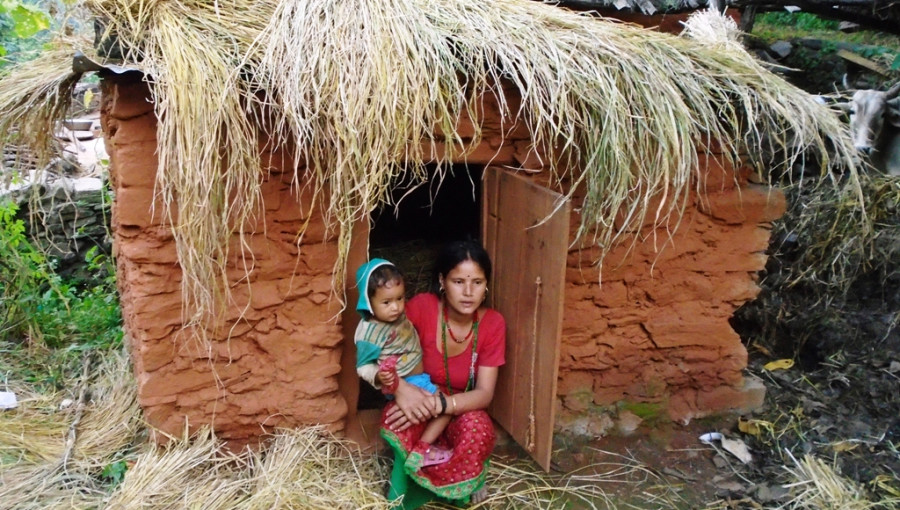National
Women are still dying after being sent to menstruation huts, but no one is filing complaints
Despite having the highest rates of deaths related to Chhaupadi, not a single police complaint has been filed in Achham and Dailekh districts, a new human rights report says.
Bhrikuti Rai
Despite having the highest rates of deaths related to Chhaupadi, not a single police complaint has been filed in Achham and Dailekh districts, a new human rights report says.
Chhaupadi, the practice of banishing menstruating women and girls from their homes to huts and cowsheds, was criminalised in 2017, but the number of women who’ve lost their lives in Nepal’s mid-western hills continues to rise.
A national enquiry report on Chhaupadi released on Friday by the National Human Rights Commission said that those who were imposing this outlawed practice on women were still not being held accountable, despite legal provisions. Penalties for enforcing Chhaupadi include a Rs 3,000 fine and a three-month jail term, or both.
According to the commission, there have been 18 reported cases of women and girls dying in chhau goths—menstrual huts—with 13 deaths reported in Achham alone since 2005, the same year Nepal’s Supreme Court outlawed Chhaupadi.
“The reason behind the deaths of these women should concern us all,” said Commission member Mohna Ansari at the launch of the report. “We need to value women’s lives.”
Just two months ago, the commission had reported similar grim findings about Chhaupadi in Achham and Dailekh.
Given how deep-rooted the practice is, supported by strongly held religious beliefs that consider women’s menstrual blood impure, women and girls from Achham say they aren’t surprised by these findings.
“People will still practice it because the fear and superstition drilled in people’s heads won't go away so easily just with the new laws,” said Tejana Khanal, an 18-year-old from Achham who was in Kathmandu this week, leading a session on the proper use of menstrual cups. Khanal is a trainer with the Rato Baltin Project, an initiative of ‘be artsy’, an organisation that promotes menstrual hygiene through the arts in Achham.
Khanal switched from menstrual pads and clothes to the more environmental-friendly menstrual cups a few years ago. At the workshop on Tuesday, she talked about how switching to cups had helped her keep her menstrual periods more discreet—no more washing blood-stained cloth pads or finding a proper place to dispose of sanitary pads. But defying the custom hasn’t been easy.
A few years ago, Khanal’s family destroyed their chhau goth, where she had spent a couple of years during her early teens. However, she is still banished from her home during her periods, now to a small room attached to the outside of her home. And this is something she feels will not change any time soon.
“If something bad happens in the village, people will blame me and my defiance to not stay in a chhau goth,” said Khanal.
The physical act of destroying the chhau huts, which started a few years ago, looks promising but is inadequate, say Achhami women.

Uttara Saud, 14, sits inside a Chaupadi shed in the hills of Legudsen village in Achham District in western Nepal in this February 16, 2014 file picture. Photo courtesy: Navesh Chitrakar / Reuters
Deeply rooted beliefs that associate impurity and bad omens with menstruating women still leave much to be done. There are also some activists who feel that the movement to root out this practice would be more effective if political parties and local-level leaders raised the issue at the grassroots level.
“NGOs working there (in Achham) will always be perceived as ‘outsiders’ being nosy, so intervention needs to come in the form of a political movement from local leaders,” said Pashupati Kunwar, an activist from Achham who has been working to remove the stigma around periods for nearly 20 years.
After the law criminalising Chhaupadi came into effect last August, the government claimed the country would soon be chhaupadi free. But less than six months later, a woman and her sons died in a menstrual hut in Bajura. This shows that just having a law in place isn’t sufficient, say activists.
“Unless there is a proper mechanism in place, how can a girl in Nepali society file a report against her family for imposing this custom?” asked writer and activist Radha Paudel. In her recent book Pavitra Ragat (Pure Blood), Paudel argues that all forms of restrictions during menstruation, including Chhaupadi, are blatant violations of human rights
“If we don’t talk about dignity, which every girl deserves during her period, the law and other forms of intervention will not be effective,” said Paudel.




 16.12°C Kathmandu
16.12°C Kathmandu














